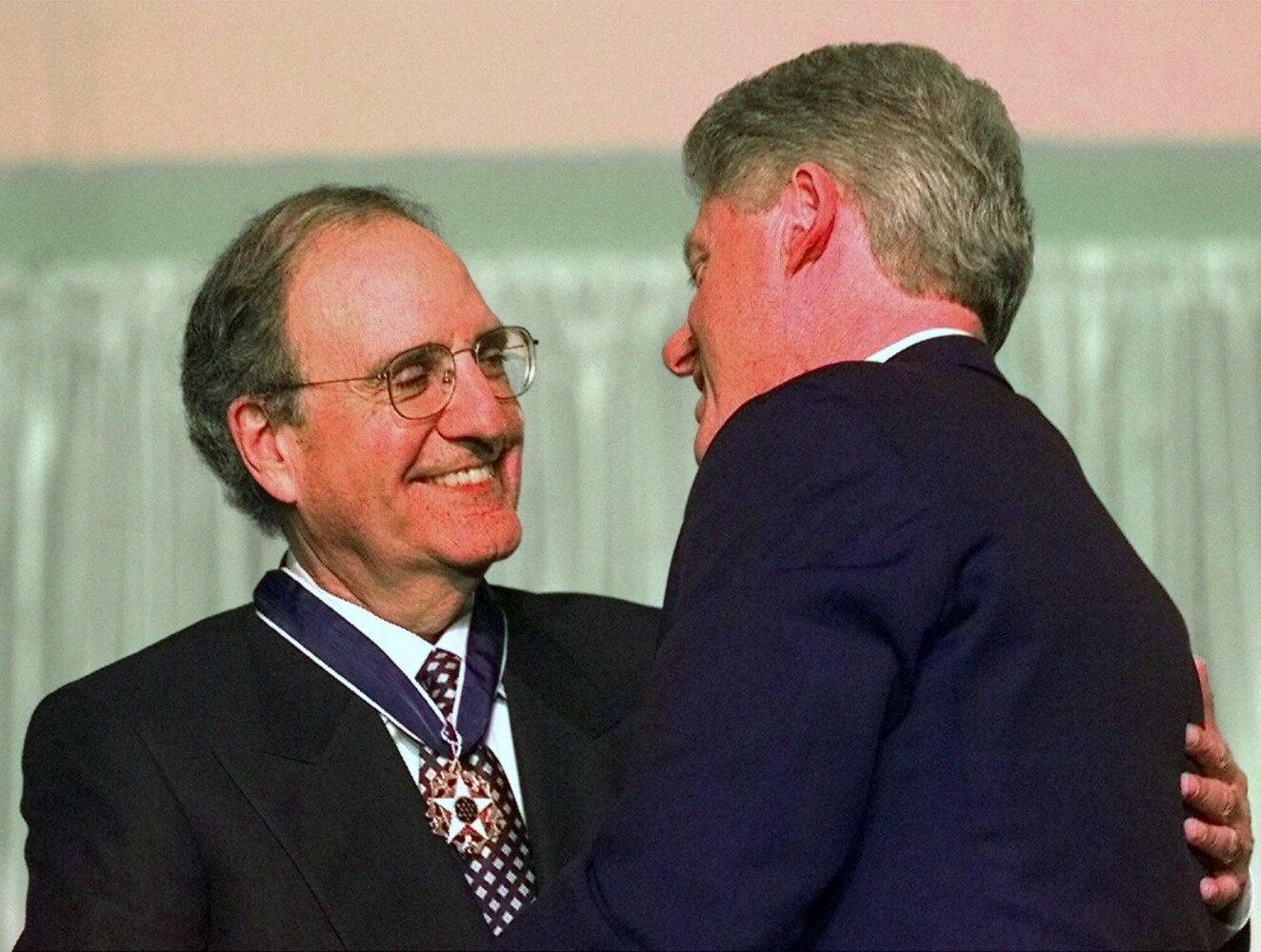[ad_1]

For his work in the peace process in Northern Ireland, former U.S. Sen. George Mitchell receives the Presidential Medal of Freedom from President Clinton, in a 1999 White House ceremony. Susan Walsh/Associated Press
Shortly after he was picked to chair peace talks in Northern Ireland, former U.S. Sen. George Mitchell remembers asking British Prime Minister John Major how long the process might take.
President Bill Clinton had sent Mitchell to develop trade with the region, but he quickly earned the trust and respect of rival political factions that had been fighting for a quarter-century and they asked if he would mediate settlement talks. That was June 1996.
“I remember Major said, ‘You’ll be home by Christmas,’” Mitchell, 89, said in an interview last week. “Now, years later we became good friends and were speaking at the same conference, and I reminded him of that conversation, and he said, ‘Well, I didn’t say Christmas of which year.’”
As it happened, Mitchell spent the better part of 15 years in Northern Ireland, on and off, including the nearly two years he spent brokering the historic Good Friday Agreement that celebrated it’s 25th-anniversary last week.
He returned to the province this weekend – likely for the final time – to deliver a speech marking the occasion at Queen’s University in Belfast, where he served as chancellor from 1999-2009. Of all his accomplishments in 60-plus years of public service, the Waterville native said helping reach an accord that effectively ended decades of instability in Northern Ireland ranks near the top.
“It’s very important to me,” Mitchell said by phone from his home in Florida. He also has a residence on Mount Desert Island, where he spends half the year. “There are a lot of things I’m proud of – of course representing the people of Maine in the Senate for 15 years, including as majority leader for six years, and creating a scholarship fund for needy students in Maine that has given out close to $20 million, I think. But Northern Ireland stands right up there with those things.”
Given his advanced age and declining health – he was diagnosed with leukemia in 2020 and is still undergoing chemotherapy – Mitchell’s decision to travel overseas to commemorate the agreement demonstrates where it ranks in his legacy.
“I think, unquestionably, this would be regarded internationally as his major accomplishment, and he would be the first to say it was not his alone,” said Brendan O’Leary, a political science professor at the University of Pennsylvania for the last two decades and an expert on Northern Ireland. O’Leary advised several parties there in the mid-to-late 1990s and met Mitchell a handful of times.
“And (the agreement) may look even better in historic light,” O’Leary said. “Of course, it also could be looked at as a temporary settlement if there is a breakdown in the future. That’s not to diminish the significance, but politics never ends. There is no such thing as a final settlement.”
***
Indeed, tension in Northern Ireland has risen since Britain’s exit from the European Union in early 2020, prompting fears that another period of sectarian conflict could be imminent.
Northern Ireland is located in the northeast quadrant of the island and is part of the United Kingdom. The remaining portion, the Republic of Ireland, is an independent nation.

On April 10, 2018, former U.S. President Bill Clinton and former U.S. Sen. George Mitchell converse at an event to mark the 20th anniversary of Northern Ireland’s Good Friday Agreement, at Queen’s University in Belfast. Brian Lawless/PA via Associated Press
The politics of Northern Ireland are complex and conflicts date back centuries, but the modern-day period that began in the 1960s and ended with the 1998 agreement is often referred to as “The Troubles.” Not quite a civil war, but a prolonged period of instability and conflict between factions that were divided over the status of Northern Ireland.
So-called unionists and loyalists, who were mostly Protestant, wanted the land to remain part of the U.K., And Nationalists, who were largely Catholic, wanted to break off and join a united Ireland. Within both sides, various political groups were fighting for different things, including the Social Democratic and Labour Party, the Ulster Unionist Party, and the Irish Republican Army (IRA), among others.
This unrest led to thousands of deaths over nearly three decades, both of civilians and military and paramilitary personnel and an unending feeling of dread among residents.
The Good Friday Agreement, reached in the early morning hours of April 10, 1998, provided a framework for Northern Ireland’s political parties, and for the British and Irish governments, to coexist in a mostly devolved system of government. It also led to the decommissioning of weapons.
“In effect, it provided a de facto constitution for Northern Ireland, which reform courts have largely upheld,” O’Leary said. “Most importantly, it delivered a sustained peace.”
Lee Umphrey, who worked with Mitchell during his time in Northern Ireland and is now president of Eastern Maine Development Corporation in Bangor, said Mitchell had a level of gravitas that proved effective.
“He allowed people to talk,” Umphrey explained. “The biggest issue for some parties was that their own constituencies were against it, and they needed time to sell it. So, for the people who thought George was too judicious or too tedious or let people talk too much … He knew what he was doing.”
Mitchell said he doesn’t know what will become of the agreement over the next 25 years and he knows he likely won’t be around for the next major anniversary. But he measures its success by one statistic alone.
“Prior to 1998, during the conflict, 3,500 were killed in sectarian violence and an estimated 50,000 people were injured, many many brutally and permanently impaired,” he said. “In 25 years since, there have been a total of about 155 security-related deaths.
“Many other things have not been resolved, but there is no society on earth that is free of differences, free of disputes. That’s the normal condition.”
***
Mitchell, one of five children born to George Mitchell Sr., a janitor at Colby College, and Mary Saad, a textile worker, and Lebanese immigrant, grew up in Waterville.
He graduated from high school at just 16 and then Bowdoin College in 1954. He then served for three years in the Army.
Upon his return, Mitchell attended law school at Georgetown University part-time. His first job out of law school was as an antitrust lawyer for the Justice Department, but he soon joined the staff of a prominent Democratic politician from Maine, U.S. Sen. Edmund Muskie. His time on Muskie’s staff was his first taste of national politics, but it took him more than a decade before that became his calling.

Click here to read more from April 11, 1998, in our archives.
Mitchell moved back to Maine in 1965 and spent a dozen years in private practice. He took a break to run for governor in 1974 but lost to Republican James Longley. Three years later, President Jimmy Carter appointed him as U.S. attorney for Maine and then briefly as a U.S. district judge.
In 1980, Carter appointed Mitchell to the U.S. Senate to replace his former mentor Muskie, who was elevated to Secretary of State.
Mitchell was then elected to the Senate twice and served as majority leader during his second term. He stepped down in 1995 when Clinton appointed him as a special adviser for economic initiatives in Ireland.
Clinton also tried to nominate Mitchell to the U.S. Supreme Court, but Mitchell declined. Stephen Breyer was nominated instead, and he served until his retirement last year.
Mitchell, meanwhile, spent six months encouraging trade and investment in Northern Ireland and organized a White House conference that was successful enough that it led to another 6-month appointment.
During that time, he said, the parties in Northern Ireland that had tried – and failed – many times to find peace were hoping to organize a new round of negotiations.
One of the major obstacles was getting the parties to surrender weapons in advance and Mitchell, who by that time had the ear of those high up in the British and Irish governments, offered his thoughts.
“I devised a mechanism to enable the talks to begin that included that any party entering the talks had to make a public declaration – and adhere to it – of nonviolence,” he said. That document came to be known as the Mitchell Principles.
O’Leary said Mitchell’s work on that document made him an easy choice to mediate the peace talks.
“Anyone who knows Mitchell knows he oozes the impartiality of a proper judge,” O’Leary said. “He was exceedingly fair and displayed the patience of Job while various parties expounded their theories.”
Umphrey stayed in Northern Ireland to work on the economic initiatives, including job training and was still there when the agreement was signed.
“I’ve known him in the Senate, in Maine, and Northern Ireland and no one anywhere has ever said to me, ‘What’s George Mitchell like?’” Umphrey said. “I think it’s because he’s a genuine guy and that always comes through. His cause was always: How can I help people?”
***
Although the Good Friday Agreement was reached in April 1998 – and later ratified by voter referendums in both Northern Ireland and Ireland – Mitchell didn’t leave right away.
He said, the deal almost unraveled a year later over the issue of decommissioning weapons. So, he stayed and worked on that, too. Paramilitary groups that had been active during the Troubles agreed to turn over many of their weapons.
For his work, Mitchell was awarded the Presidential Medal of Freedom and the Liberty Medal and was nominated for the Nobel Peace Prize.

Five years ago, some of the central figures who negotiated the Good Friday Agreement in Northern Ireland gather to celebrate its 20th anniversary in Belfast. Left to right, they are former Irish Taoiseach (prime minister) Bertie Ahern, U.S. Sen. George Mitchell and Sinn Fein leader Gerry Adams, the architects of the peace accord credited with ending three decades of sectarian violence that claimed thousands of lives. Brian Lawless/PA via Associated Press
In 1999 op-ed in The New York Times, Mitchell summed it up this way: “Neither side will get all it wanted, and both will endure political pain. But there is no other way forward. A ‘solution’ that entirely favored one side over the other would be no solution at all. If this process succeeds, the real winners will be the people of Northern Ireland.”
After the agreement, he returned on and off during his tenure as chancellor of Queen’s University – a role he said was mostly ceremonial – even as he took on other high-profile projects.
Mitchell also led a commission to find solutions for resolving the conflict between Israelis and Palestinians in the Middle East, which led to a 2001 report he authored but not to lasting peace.
He later was asked to investigate steroid use in baseball, which led to another report that bears his name.
But his time in Northern Ireland looms perhaps largest in Mitchell’s legacy, something he’s had time to reflect on over the last two years battling cancer.
During remarks in Belfast on Wednesday, President Biden spoke about the significance of the peace deal and quoted Mitchell, who said at the time there were “700 days of failure and one day of success.”
Others have credited Mitchell over the years for his approach. The opposing parties agreed to disagree on the larger issue but did commit to peace, which included laying down weapons and ending what had become known as punishment beatings.
“It’s difficult to see who could have played a comparable role,” O’Leary said. “He had led in the Senate, which at that time was a deliberative body, compared to today. He was very eloquent and good at summing up other people’s position in a non-antagonistic way.”
Mitchell said he agreed many months ago to give a speech in Belfast on the 25h anniversary of the peace agreement. In it, he both recognizes the goodwill that was built by the agreement and acknowledges that the future is never certain.
Mitchell’s doctors advised him to consider not traveling, and he agreed to make alternative arrangements to give the speech by video from a studio in Florida in case his health worsened. But he said it would take a lot to keep him from visiting one last time.
“This will be, I don’t want to say my final declaration, but maybe my final on this topic,” he said.
« Previous
Next »
Related Stories
[ad_2]
Source link





Invalid username/password.
Please check your email to confirm and complete your registration.
Use the form below to reset your password. When you’ve submitted your account email, we will send an email with a reset code.